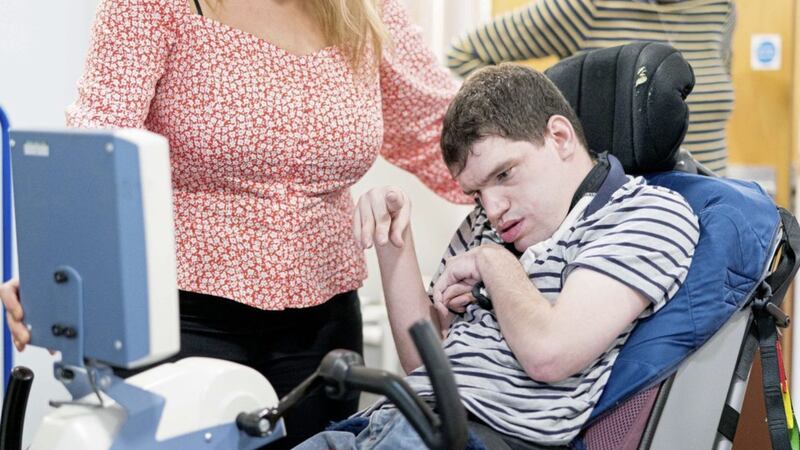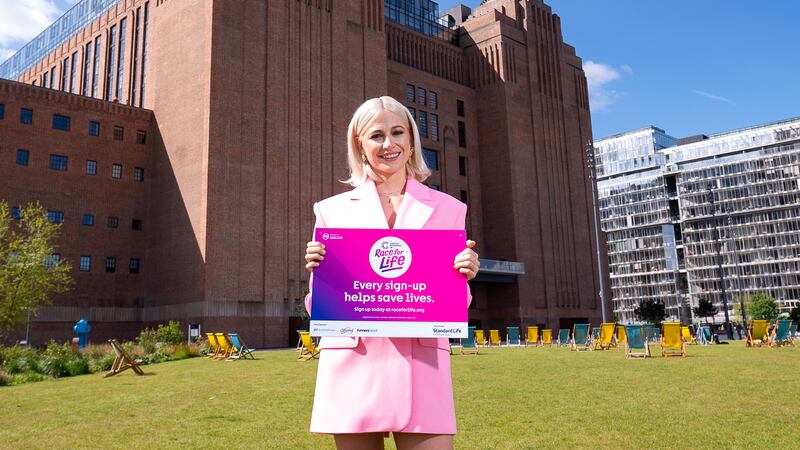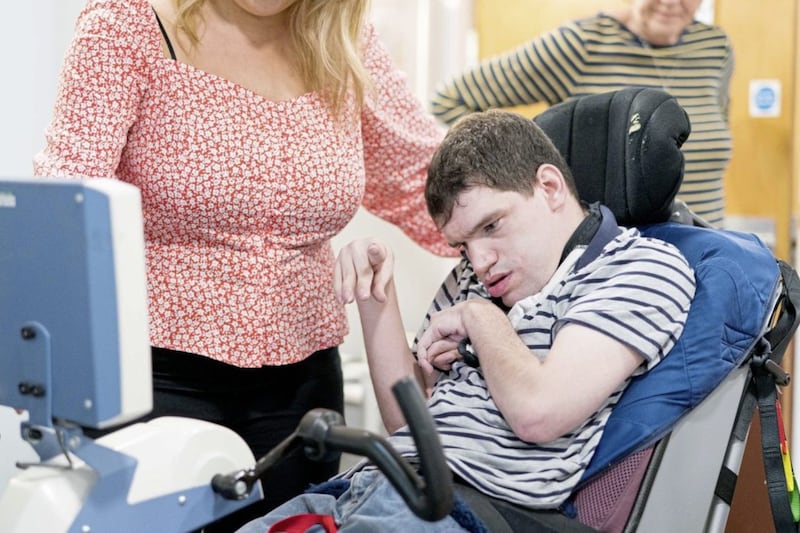AS A service manager providing care and support to 21 disabled people in south Belfast, Zoe Alexander's workplace duties are continually changing and evolving to meet the challenges of the Covid-19 crisis.
“Last week I was chief reassurer; the week before, PPE sourcer,” says Zoe, who was promoted to the management post within the Leonard Cheshire health and social care charity just last year.
To say the Co Down woman has had a baptism of fire in her new role is an understatement. For five years, she worked as a support worker at the charity's north Belfast supported living service, The Maples, and was just getting used to her new team and service users at Derryvolgie Avenue when the pandemic struck.
Zoe is one of a number of women leading the charge by looking after some of the north's most vulnerable people during lockdown.
“My job as service manager involves ensuring the safety, health and wellbeing of these people who live on site in south Belfast and who predominantly have physical disabilities,” she says. “I'm also responsible for supporting the staff team as well and ensuring their wellbeing.
“One of the greatest challenges since the outbreak of the coronavirus has been ensuring we are meeting adequate staffing levels to provide the best care and support we can. That's become more difficult to balance in the light of staff having to go off due to pre-existing health conditions or having to self-isolate.
“Balancing this staffing crisis with meeting the needs of our service users means having to pull together every resource and support system going. It's meant that staff who don't work in the care services but in areas like fundraising or within the community team in Omagh are having to be trained up and redeployed, which has been a huge help.
“It's all about making sure there are enough bodies on shift and that they are adequately prepared for the tasks at hand.”
Reassurance has become a pivotal part of her job as staff, service users at Taylor House and Cheshire House and their families are naturally concerned about protection. Communications from various sources have been conflicting around PPE and testing, which Zoe finds frustrating. One service user tested positive about a month ago and went into self-isolation. He has since made a full recovery and two staff who had interacted with him were also tested. Both their results came back negative and they were able to return to work after 14 days.
“Before that service user became symptomatic we had told everyone to stay in their rooms and not to be mixing communally,” says Zoe. “They're used to eating together and have their routines so that first week or two of getting them to stay in their rooms was difficult.
“We had to think up creative ways to keep them occupied. Each has a door that leads to the outside so they're able to sit out and have their lunch while maintaining distance of three to four metres. The good weather has certainly helped.”
Zoe says she could never have imagined such a crisis within social care when she took up her new post. But she says she is 'humbled' by the hard work and dedication of her staff.
“This is an unprecedented situation and I think we've risen well to the challenge,” she says. “My staff are providing an essential service to hugely vulnerable people for low rates of pay. They can't stay at home. They have to turn up at work every day. The last week or so has seen a surge in support for all care workers. It's only right they should be considered invaluable too.”
Katherine McElroy is the north's community engagement manager for Leonard Cheshire, overseeing a number of community services which support people with disabilities to live, learn and work in ways that they choose.
The Omagh woman has seen her role evolve too in the fightback against Covid-19. While working to ensure those within the community are still supported in these challenging times, Katherine is also responsible for the redeployment of staff. Members of the community teams have undergone upskilling so they can work in the supported living services if staff are off sick or self-isolating.
“During the pandemic I have been coordinating the retraining of community staff, working with service managers to fill vacant shift rotas and ensuring all community staff are supported in their new roles as well as ensuring they are receiving all advice and guidance coming from government and from Leonard Cheshire,” says Katherine.
“When people enter employment with Leonard Cheshire, they have in-service training around areas like confidentiality, safeguarding, that type of thing. Those not working directly with personal care wouldn't have had training in say, how to hoist people, how to help with medications or infection control. Upskilling provides that kind of knowledge.”
Katherine says the charity hit the ground running six weeks ago once it identified the need for redeployment of staff. Supplementing care staff with community staff when numbers have been depleted has proven successful so far.
“Thankfully to date, we have been able to maintain staff at a safe level,” says Katherine. “The community staff have really stepped up and accepted redeployment. Those with health issues which meant they couldn't be redeployed in personal care, have been kept active in terms of telephone support or coordinating with voluntary organisations.
“Others have maybe come from working in a nursing home or another care environment so working in personal care isn't a great leap for them.
“To be fair, the type of person who comes to work in a charity like this is the type who will be prepared to go that extra mile. They do it precisely because they care. These are people who are low paid but most certainly not low skilled. That level of commitment is wonderful to see at such difficult times.”
Danielle Saunderson's career in social care began 16 years ago as a volunteer. She joined Leonard Cheshire in 2018 and works as a services manager, looking after over 50 staff and 41 service users in two complexes in north and west Belfast.
The Maples, in the north of the city, is home to 31 people with a range of needs including physical and mental health issues, alcohol-related brain injuries and alcohol dependency. The west Belfast site, Springfield Court, is made up of 10 bungalows for people with physical disabilities.
“The first two weeks of the lockdown were tough,” Danielle says. “At the Maples, some of the service users have alcohol issues and just weren't getting the seriousness of it all."
She adds: “Things did settle down and there's been a dramatic decrease in people going out of the building. But I won't lie; those were a very challenging few weeks.”
A number of staff have been tested and seven are currently off, including one worker whose wife is a nurse and has tested positive for Covid-19.
“I can't deny that I do worry about my staff,” Danielle says. “But I walk through those doors, take a deep breath and do my best to reassure them.
“We have PPE and we're getting a donation of visors. We have put things in place to reduce the risk as far as is humanly possible. Staff don't have their breaks together; they practise social distancing. But it's still frightening.
“And yet my staff still come to work with smiles on their faces. They still try and have fun and keep spirits up. They behave like it's business as usual while undertaking potentially the most dangerous work they will ever face in their career.”





